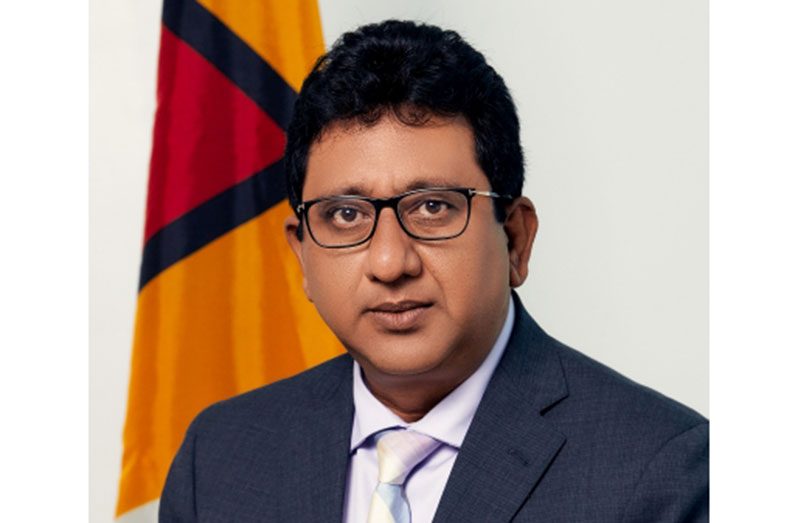–with passage of Registration of Births and Deaths (Amendment) Bill
THE process of acquiring a birth certificate has now been made easier with the passage of the Registration of Births and Deaths (Amendment) Bill 2021 in the National Assembly.
Minister of Home Affairs, Robeson Benn, said a birth certificate is a critical representation of one’s citizenship and there are many instances where persons have faced challenges acquiring the document. “Sometimes the process and systems work against people in the interior communities, particularly people who we have to acknowledge are the First Peoples of Guyana and who, by any means necessary, should obtain a birth certificate,” he said. This amendment adds a new clause that allows an adult with no original document containing particulars of his or her birth or record of birth, to be issued a certificate after being validated by a high standing person in his/her community which includes a Toshao.
Minister Benn said the previous Department of Citizenship was accused of working against the interest of persons in relation to getting a birth certificate. He said this was coupled with the discovery of fake stamps that were used to stamp birth certificates and other documents at the General Register Office.

“Our efforts now in bringing the amendments to the Registration of Births and Deaths, relate to strengthening the measures by which persons can validly be given their birth certificates, that we expand the architecture in respect of places where people could get documentation to prove that they were born as Guyanese citizens.
“That we can ensure that there is a track record, that there is a paper trail in respect of ensuring that we can go back up the ladder to assure that documentation which is presented is valid, that we speed up the ability of persons to get birth certificates,” the minister related.
He said the delay in issuing birth certificates conflicts with the rights of Guyanese to have in their possession a form of identification.
“This Bill seeks to simplify and clarify certain areas in the Act. An area of change is where an application is made to a Magistrate to correct an error in the birth or death registration form.
“We are aware that, in many cases, mistakes are made in the record and having seen the discovery of an error, it results in finding an opportunity for delays, for frustration and sometimes for grief and the giving up of persons in relation to obtaining what is rightfully theirs…,” Benn said.

Minister Benn said the Bill also identifies the types of error a Magistrate might correct. Further, the unnecessary restrictive provisions, limiting the timeframe within which a child’s name can be changed on the registration form, and the necessity to appear before a Magistrate to have the entry done, have been removed.
The law against the discriminatory practice to issue a different colour document for an adopted child as opposed to a birthed child has also been removed. Opposition Member of Parliament, Amanza Walton-Desir praised this amendment during her presentation.
Attorney-General and Minister of Legal Affairs, Anil Nandlall, S.C., said the amendment to the Bill has allowed the government to fulfill Guyana’s duties under the treaties it has signed at the level of the United Nations. “What we are doing here, we have a duty to do… this Bill, Mr. Speaker, must be situated and predicated into that context…
“What we are doing here is to give effect to Guyana’s international obligation, which we are all required to do. It binds the Executive, the Legislature and the Judiciary and every other organ of the State to do what we are doing here,” he said. The Attorney-General further said that every provision in the Bill had been carefully thought-out.
In his view, it is a remarkable step in taking Guyana forward, and in advancing its obligations under the Rights of the Child Convention and the United Nations Development Sustainable Goals.
Meanwhile, Minister of Parliamentary Affairs and Governance, Gail Teixeira, during her presentation, said that laws are made based on the reality and social needs of citizens.
The minister pointed out that there are several households headed by single mothers and many Indo-Guyanese, mostly females with only one name.
The amended Bill, Minister Teixeira said, fixes the problem by allowing a parent to choose any name for a child. Additionally, the minister said that there are many people in the hinterland without identification cards due to the lack of a birth certificate. “There are people all over this country who statistically do not exist. So, when you talk about a population of less than 700,000, we may very well be dealing with a population with way over 800,000. “The only time we discover this is when we have elections and you go house-to-house and you discover people who do not have an identification card. This attempts to deal with that,” she reasoned. Government Member of Parliament, Alister Charlie, representing Region Nine, said the Amendment to Bill will address the woes of persons living in the hinterland regions.
Charlie said it is another intervention by the government to bring relief to Amerindian and hinterland residents. (DPI)











